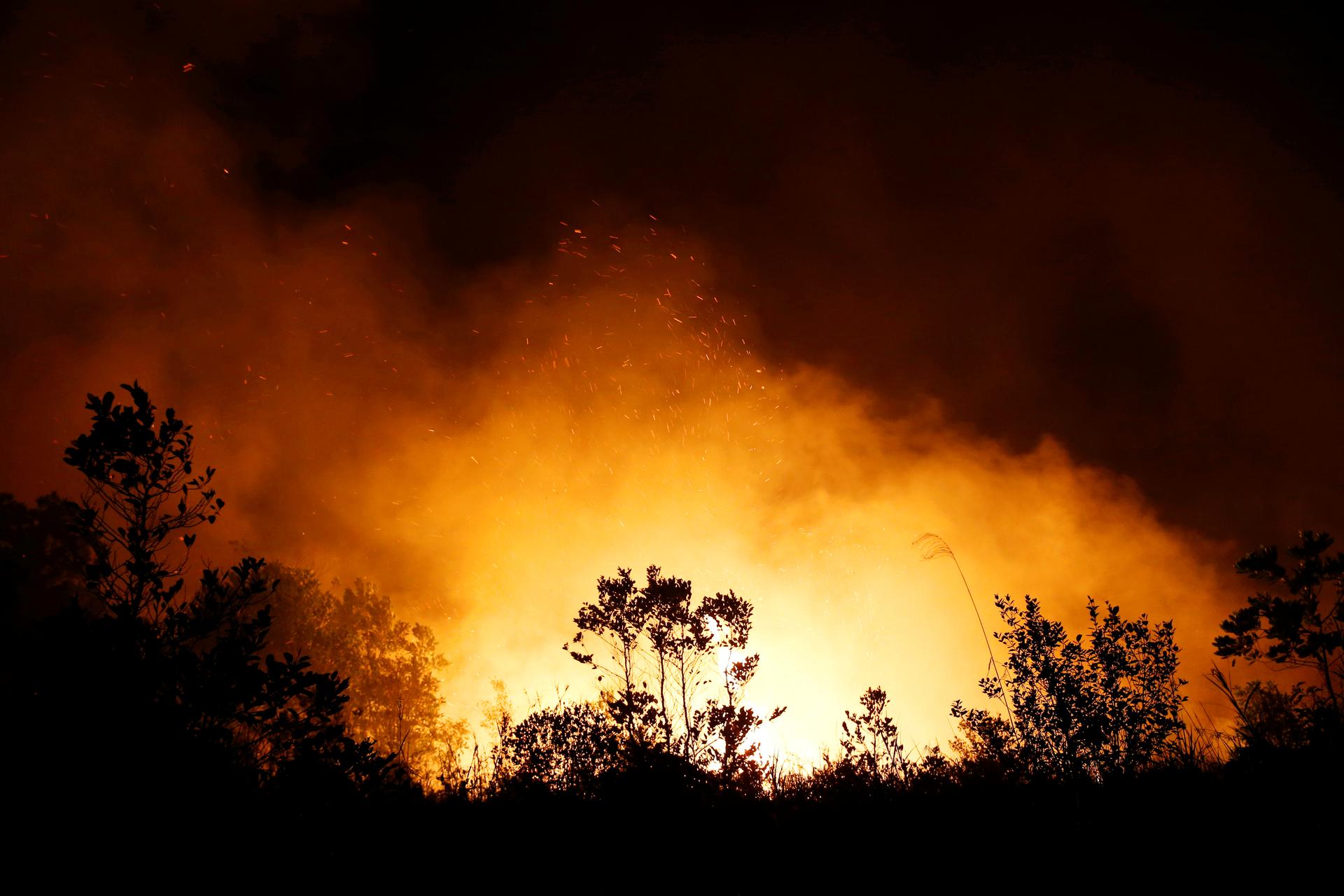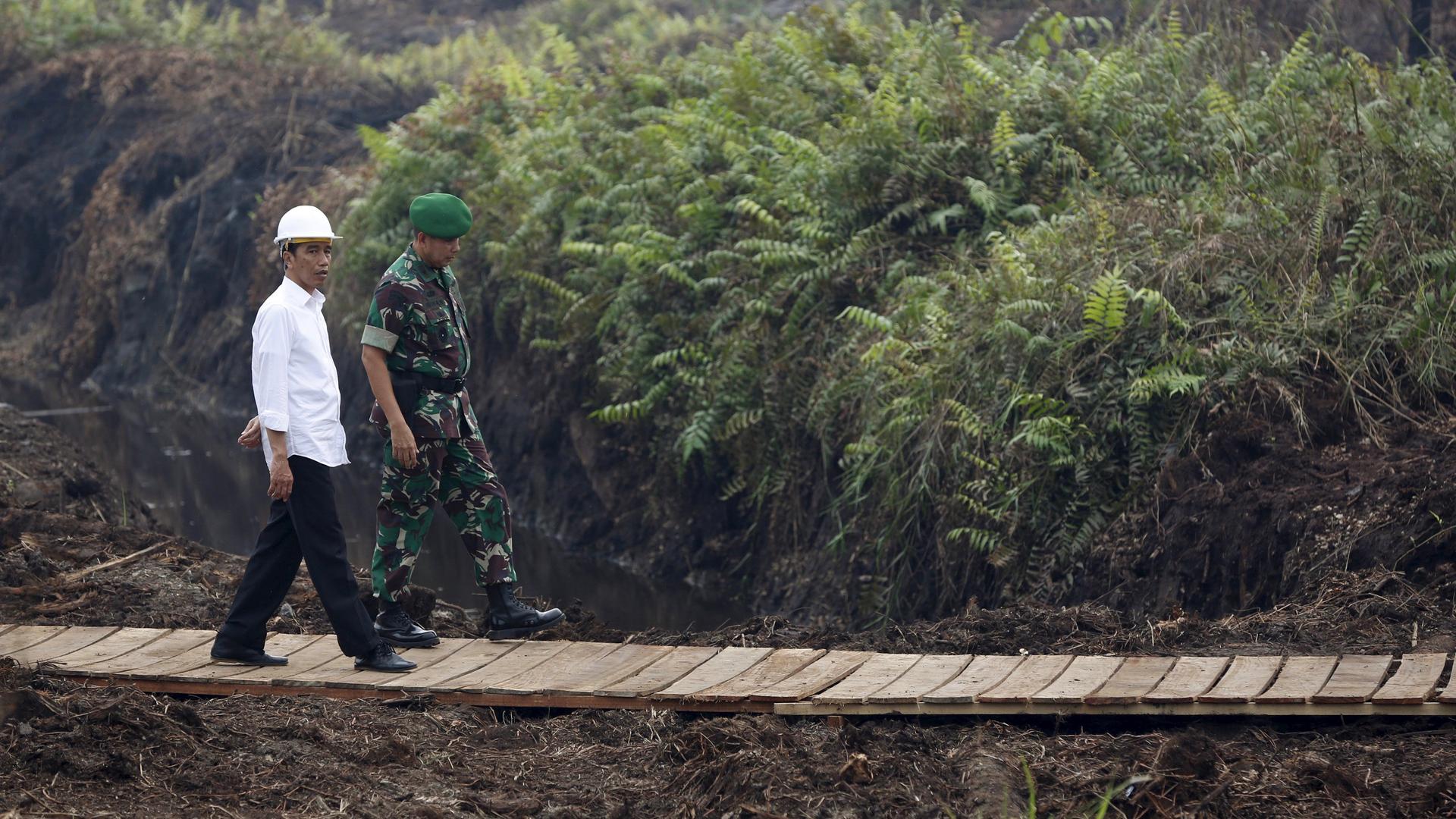Indonesia’s bold plan: Moving its capital to an island paradise
Indonesian President Joko Widodo (left) inspects a newly built canal to prevent peatland fires in Pulang Pisau, east of Palangkaraya, central Kalimantan, Oct. 31, 2015. Widodo cut short an official trip to the United States due to a haze crisis caused by raging peat fires in the Southeast Asian country. After weeks of hazardous air caused by haze-producing forest fires, people on Indonesia’s southern Sumatra and Kalimantan islands have finally found respite after three days of persistent rain significantly improved the air quality and quelled many of the raging forest fires, according to the national disaster agency on Friday.
It’s a dilemma for megacities from Rio de Janeiro to Lagos to Manila.
For decades, the magnetic pull of jobs has drawn people from the countryside into these boomtowns. And now, the traffic is hell, sewers overflow and trash piles up. Add to that the looming specter of rising seas, possibly swallowing whole neighborhoods as this century grows hotter.
But in Indonesia — home to Jakarta, its crowded and polluted capital — the president has a plan.
Related: Indonesia’s newest Gen Z craze? Marrying someone you’ve never even dated.
He is, in short, giving up on Jakarta as a seat of government and preparing to bail to a tropical island.
The city and its environs hold roughly 30 million people. That’s a population larger than in Australia, somehow crammed into an area smaller than Miami-Dade County. The resulting dysfunction bleeds the economy of an estimated $7 billion per year in productivity loss.
That isn’t sustainable, says President Joko Widodo. On Twitter, he has vowed to fulfill his “great vision”: building a capital that can flourish “50 to 100 years from now.”
So far, the details are sparse. But officials imagine a “smart city in the forest,” a new capital run on renewable energy, where you can drink the tap water (a dicey proposition in Jakarta) and more than half of the city is covered in trees.
This eco-utopian capital will be built in Kalimantan, an Indonesian-controlled portion of Asia’s largest island: Borneo. The exact site (near an area called Kutai Kartanegara) is now mostly jungle.
Related: Protecting Indonesia’s forests, one doctor’s appointment at a time
It won’t stay pristine for long. The government wants to move fast, starting construction within two years and — in about five years —roughly 1.5 million bureaucrats will move to the new capital, making it far and away the island’s most populated city.
The word “Borneo” conjures virgin jungle, shrill birdsong and orangutans wandering through the mist. But at the moment, there’s a glaring problem with the government’s vision, says Arie Rompas, an environmental activist from central Kalimantan.
The island is literally on fire.

“It’s a really terrible problem,” Rompas tells The World. He describes whole cities bathing in yellow smoke, shuttering schools and sending the elderly to their sickbeds.
Each year, parts of Borneo (as well as other islands in Indonesia) go up in flames. These forest fires are caused by small farmers and massive corporate plantations alike — both of which torch away jungle to clear land for crops. (This includes palm trees, which produce oils that go into products lining US supermarket shelves: potato chips, shampoo, detergent and much more.)
Related: How to save forests? Run them like a business, says this former Wall Street man.
These fires are so smoky that, in a really bad year, Indonesia can churn out more carbon pollution than one of the world’s worst emitters: the United States.
Four years ago, Rompas and other Kalimantan natives came together to sue the government, insisting officials were not doing enough to stop the devastating fires. In June, Supreme Court judges sided with the citizens, arguing the government was indeed lax in preventing the blazes — and that it should provide free care for those suffering from lung ailments.
Environmentalists aren’t opposed to a jungle capital per se, says Rompas, who said it might even be a “good idea.” But they are jaded by the government’s track record on the island and need more assurance that the new city won’t bring Jakarta-style pollution to Borneo.
The city is expected to take up more than 600 square miles, about the size of Chicago, and building it will require mowing down large tracts of jungle.
Related: Indonesia’s forests are key for saving orangutans — and slowing climate change
For now, as Borneo burns — forcing more than 100,000 locals to seek medical care — the government is attempting to reverse its reputation for negligence. Officials are currently investigating plantation firms and rounding up nearly 200 people suspected of starting fires.
Our coverage reaches millions each week, but only a small fraction of listeners contribute to sustain our program. We still need 224 more people to donate $100 or $10/monthly to unlock our $67,000 match. Will you help us get there today?
